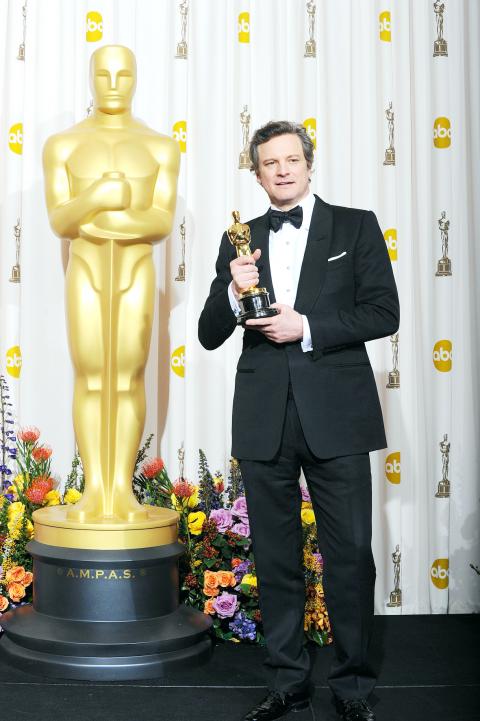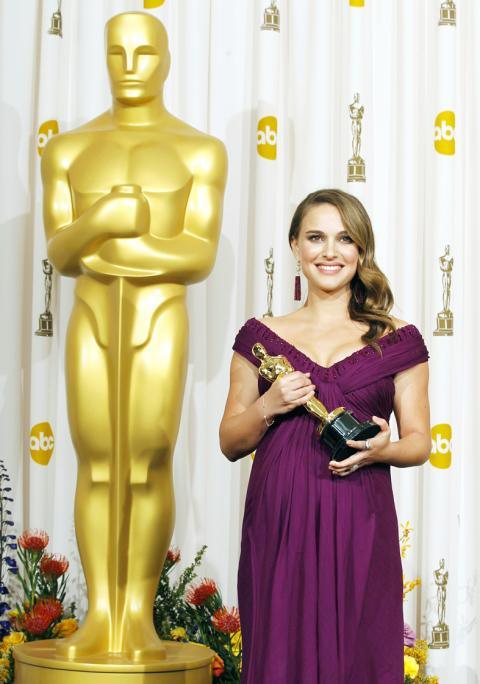The King’s Speech was crowned the big winner with four Oscars on Sunday, including best film and best actor for its star Colin Firth on a night with few surprises among winners at the top movie awards.
Joining British actor Firth on the Academy Award ceremony stage was the film’s director Tom Hooper and its screenwriter, David Seidler.
Natalie Portman claimed the best actress Academy Award for her portrayal of a young ballerina who grows into womanhood in Black Swan, and Melissa Leo and Christian Bale won best supporting actress and actor, respectively, for The Fighter.

Photo: AFP
The world’s top film honors from the Academy of Motion Picture Arts and Sciences came packed with a lot of comedy onstage from show hosts Anne Hathaway and James Franco but the attention, as always, was on awards and winners.
Portman wiped tears from her eyes onstage while cradling her gold statuette. She thanked her family, costars and director Darren Aronofsky.
“This is insane,” she said, “and I truly, sincerely wish the prize was to get to work with my fellow nominees.” Backstage, she told reporters she felt she was in a dream.

Photo: AFP
Firth won best actor for playing stammering British King George VI in The King’s Speech, in which the monarch overcomes his speech impediment to lead his country.
“I have a feeling my career just peaked,” Firth joked.
When Hooper was named best director, he thanked his mom for being first to suggest he make The King’s Speech. “The moral of the story is, listen to your mother,” Hooper said.
Among other key winners were family comedy Toy Story 3 for best animated feature, Wall Street meltdown movie Inside Job for top documentary and Denmark’s In a Better World took the prize for foreign language film.
A NIGHT FOR FRONT-RUNNERS
Awards were split among a wide array of films. Science fiction thriller Inception claimed four Oscars in categories for cinematography, sound editing, sound mixing and visual effects.
Facebook film The Social Network claimed three awards for original score, film editing and adapted screenplay for its writer Aaron Sorkin. But left off the list of winners was the movie’s director, David Fincher.
In fact, Fincher’s loss to Hooper was the only mild surprise among top awards as many pundits thought the Hollywood veteran would beat relative newcomer Hooper.
Franco and Hathaway, the first man and woman team to host the Oscars, got the show off to a comic start in a pre-taped sequence in which they entered the “dreams” of Alec Baldwin much like the characters of Inception entered the dreams of other people. From there, the pair traveled back to scenes with other top movie nominees — True Grit, The Social Network, The Fighter and The King’s Speech.
Back on stage, Hathaway introduced her mom in the audience, who told her to stand up straight, and Franco’s grandmother exclaimed that she’d just met Marky Mark, the stage name of actor/producer Mark Wahlberg when he was a rapper.
In one off-the-cuff moment, winner Leo uttered an expletive on stage, the so-called “F-bomb,” which was bleeped out.
Many sequences harkened back to Hollywood’s history with film clips from Gone With the Wind, Titanic and other films, and at one point, Franco came onstage in a dress and blonde wig, looking like Marilyn Monroe.
“The weird part is, I just got a text message from Charlie Sheen,” Franco joked.
THE FASHION STAKES
Top actresses dazzled on the red carpet with bright and colorful fashion choices, a turnaround from more muted styles of recent years that reflected the world’s economic woes.
“Oscar gowns have gone so far away from the classic gowns with those plunging necklines,” InStyle magazine’s fashion director Hal Rubenstein said. “This year so much is about cut and shape and really strong color.”

April 28 to May 4 During the Japanese colonial era, a city’s “first” high school typically served Japanese students, while Taiwanese attended the “second” high school. Only in Taichung was this reversed. That’s because when Taichung First High School opened its doors on May 1, 1915 to serve Taiwanese students who were previously barred from secondary education, it was the only high school in town. Former principal Hideo Azukisawa threatened to quit when the government in 1922 attempted to transfer the “first” designation to a new local high school for Japanese students, leading to this unusual situation. Prior to the Taichung First

Chinese Nationalist Party (KMT) Chairman Eric Chu (朱立倫) hatched a bold plan to charge forward and seize the initiative when he held a protest in front of the Taipei City Prosecutors’ Office. Though risky, because illegal, its success would help tackle at least six problems facing both himself and the KMT. What he did not see coming was Taipei Mayor Chiang Wan-an (將萬安) tripping him up out of the gate. In spite of Chu being the most consequential and successful KMT chairman since the early 2010s — arguably saving the party from financial ruin and restoring its electoral viability —

The Ministry of Education last month proposed a nationwide ban on mobile devices in schools, aiming to curb concerns over student phone addiction. Under the revised regulation, which will take effect in August, teachers and schools will be required to collect mobile devices — including phones, laptops and wearables devices — for safekeeping during school hours, unless they are being used for educational purposes. For Chang Fong-ching (張鳳琴), the ban will have a positive impact. “It’s a good move,” says the professor in the department of

Article 2 of the Additional Articles of the Constitution of the Republic of China (中華民國憲法增修條文) stipulates that upon a vote of no confidence in the premier, the president can dissolve the legislature within 10 days. If the legislature is dissolved, a new legislative election must be held within 60 days, and the legislators’ terms will then be reckoned from that election. Two weeks ago Taipei Mayor Chiang Wan-an (蔣萬安) of the Chinese Nationalist Party (KMT) proposed that the legislature hold a vote of no confidence in the premier and dare the president to dissolve the legislature. The legislature is currently controlled